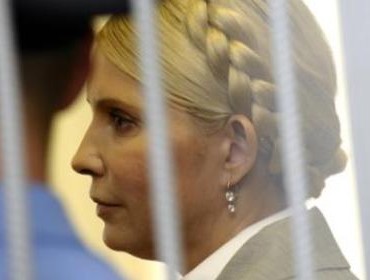By Alyona Getmanchuk, Director of th Institute of World Policy for The New York Times / International Herald TribuneA Ukrainian court’s conviction of Yulia Tymoshenko on charges of abusing her powers when she signed natural-gas contracts with Russia in 2009, when she was the prime minister, is not necessarily proof that she actually committed a crime.
Nobody, except perhaps President Viktor Yanukovich and his inner circle, really believes in the independence of the Ukrainian judiciary. In fact, this case can be viewed as a new chapter in Ukrainian politics — criminal prosecution for political motives.
Yanukovich had two such motives. First was to get rid of an opposition leader whose presence in the political arena has been a source of acute discomfort for him since the days of the Orange Revolution. Tymoshenko played a leading role in that popular uprising, which blocked Yanukovich’s first attempt in 2004 to secure the presidency. In his second bid in 2010, he narrowly defeated Tymoshenko.
The second motive was to use the Tymoshenko case as leverage against Russia to lower the price of gas sold to Ukraine. In the trial, Russia figured as an accomplice in an illegal transaction, and Prime Minister Vladimir Putin and President Dmitri Medvedev as allies of Tymoshenko — an ironic reversal of Yanukovich’s reputation in the West as the Kremlin’s ally.
The Ukrainian government regards the current price of Russian gas as unfair, especially after Yanukovich, in a bid to lower it, extended the lease on Russian naval bases in the Crimea for 25 years, to 2042, and rejected NATO membership for Ukraine.
Yanukovich clearly did not expect that immediately after he satisfied those two Russian demands, Moscow would add two more: Ukrainian accession to a customs union with Russia, Belarus and Kazakhstan, and the merger of the Ukrainian gas company Naftogaz with Russia’s Gazprom — a union that would give the Kremlin control over Ukraine’s gas transport network.
Yet the prosecution of Tymoshenko could end up as a political sentence for Yanukovich. For one thing, Tymoshenko would probably be the most convenient sparring partner if he runs for re-election in 2015. Public distrust of Tymoshenko is higher than of most other Ukrainian politicians, so she would be less dangerous as an active opponent than as a political martyr.
Ukrainians are so fed up with the old politicians that virtually any new face could pose a more serious challenge to Yanukovich than Tymoshenko. A recent poll, for example, showed that the 37-year-old leader of the “Front for Change,” the former Foreign Minister Arseniy Yatsenyuk, would be a greater threat to Yanukovich than Tymoshenko.
The Tymoshenko case also stands to seriously harm Ukraine’s relations with the European Union — relations which are essential to Ukraine’s future. This month Ukraine is supposed to be dotting the final “i” in its negotiations over an Association Agreement with the European Union, which includes an agreement on a free trade zone. Paradoxical as it may sound, the “pro-Russian” Yanukovich now has a better chance to bring Ukraine closer to the E.U. than his “pro-European” predecessor, Viktor Yushchenko, ever had.
An Association Agreement with the E.U. would preclude Ukraine’s participation in a customs union with Russia, Belarus and Kazakhstan, and make Ukraine’s European path irreversible. But over the past month Yanukovich has received clear signals from Europe that sending Tymoshenko to prison will create problems for the Kiev-Brussels dialogue and for the subsequent ratification of any agreements by European parliaments.
The problem is that some advisers to Yanukovich believe that European negotiators are using Tymoshenko as a pretext for slowing down Ukraine’s integration in the E.U., and that if there were no Tymoshenko case, they’d find another pretext. They also believe that the E.U. will sign an Association Agreement no matter how the Tymoshenko case is resolved.
Finally, a guilty verdict against Tymoshenko clearly will not improve relations with Russia. The issue is not Tymoshenko herself — though many in Kiev and Moscow believe that Putin now prefers her to Yanukovich as a partner. The fact is that her case involves natural-gas agreements with Russia; a guilty verdict is more likely to worsen Yanukovich’s relations with Putin than to make Russia more compliant on gas prices. That is not what Yanukovich needs in advance of parliamentary elections scheduled for next year.
The Tymoshenko case is not a battle of good and evil, of a “democratic and pro-European” Tymoshenko against an “autocratic and pro-Russian” Yanukovich, as some in the West seem to think. Yulia Tymoshenko is not a symbol of Ukrainian democracy, nor of Ukraine’s European choice. But this court ruling against her could have serious negative consequences both for Ukraine’s democracy and its European hopes.
Do Ukrainian leaders understand that? If yes, they should do everything possible to alter Ukraine’s Soviet-era laws, and to set Tymoshenko free.




Comments theme
Comments themeComments themeComments themeComments themeComments themeComments themeComments themeComments themeComments themeComments themeComments themeComments themeComments themeComments themeComments themeComments themeComments themeComments themeComments themeComments.